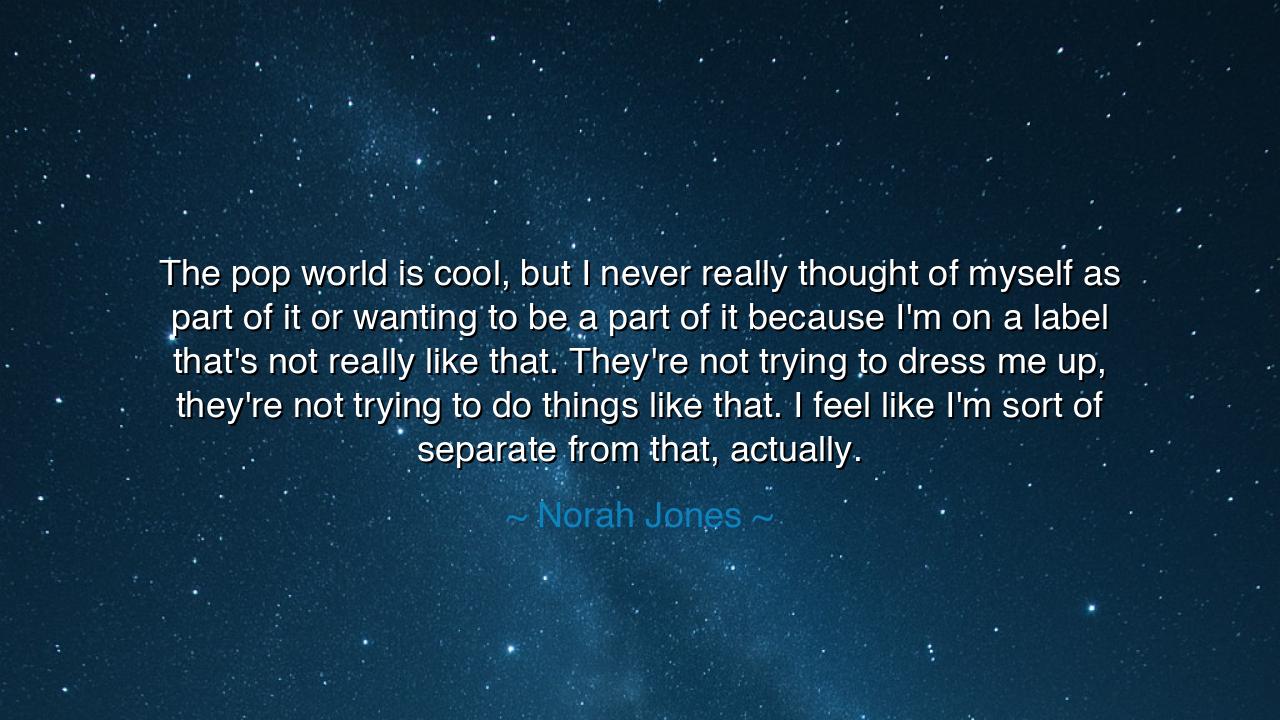
The pop world is cool, but I never really thought of myself as
The pop world is cool, but I never really thought of myself as part of it or wanting to be a part of it because I'm on a label that's not really like that. They're not trying to dress me up, they're not trying to do things like that. I feel like I'm sort of separate from that, actually.






In the vast expanse of human existence, there are moments when the individual must choose to walk their own path, regardless of the masses or the allure of conformity. The words of Norah Jones, “The pop world is cool, but I never really thought of myself as part of it or wanting to be a part of it because I'm on a label that's not really like that. They're not trying to dress me up, they're not trying to do things like that. I feel like I'm sort of separate from that, actually,” echo a deep truth about the nature of identity and artistry. Jones, in her assertion, speaks not just about the world of music, but about a universal struggle—the tension between being true to oneself and the pressure to conform to the expectations of others.
In a world where the pop culture reigns, where celebrity is often manufactured rather than earned, Jones finds herself standing apart from the glittering spectacle. The pop world, with its dazzling lights, flashing cameras, and ever-shifting trends, may captivate the attention of many, but for Jones, it is not the path she wishes to walk. Her choice to remain separate from this world is an act of defiance, an assertion that true artistry cannot be bound by the superficial. In this, she embodies the ancient wisdom of those who sought to remain true to their craft, refusing to be swept away by the tides of fleeting popularity.
Consider, if you will, the example of Socrates, the great philosopher who rejected the allure of wealth, fame, and societal approval. Socrates lived in a world where the status of a man was often determined by his ability to speak well in public or accumulate wealth, yet he chose a path that would bring him neither fame nor fortune. He sought truth and wisdom, not the applause of the many, and was willing to die for his beliefs rather than compromise his integrity. Similarly, Jones’s separation from the pop world is an act of self-respect, a refusal to be molded by forces outside of her control. She understands that true artistry lies in remaining faithful to one's own vision, regardless of the external pressures to conform.
This principle is evident in the story of Leonardo da Vinci, one of history's greatest minds. Da Vinci was not swayed by the whims of royal courts or the demands of patrons who sought to shape his work for their own agendas. His genius was not dictated by the fashion of his time but by his own deep curiosity and commitment to the pursuit of knowledge. He worked at his own pace, on his own terms, producing masterpieces not to satisfy the expectations of others, but to express his vision of the world. Like Leonardo, Jones refuses to allow the trappings of celebrity to define her. Instead, she stays true to her craft, creating music that resonates with her soul rather than adhering to the demands of the pop machine.
The wisdom of Jones’s stance lies in the freedom she claims by rejecting the superficial. The pop world is often driven by trends—its stars are manufactured to fit a mold that will sell records and capture the fleeting attention of the public. Yet, as history has shown, these trends are ephemeral. The music that endures, the art that lasts, is that which is created with authenticity, with a deep sense of purpose. Jones’s music is not made for the fleeting moments of fame but for something deeper—a connection to the listener’s own heart, unencumbered by the pressure to conform.
In the ancient world, artists and philosophers alike were often outsiders—those who did not seek the approval of the many, but the truth of the few. They understood that the path to greatness lay not in mimicry, but in the courage to follow their own vision. Aristotle taught that the highest form of art was that which came from the individual’s soul, not from the demands of the crowd. Similarly, the greatest writers, painters, and musicians throughout history were those who chose to express themselves authentically, regardless of the pressures of their society.
And so, the lesson here is clear: in a world that constantly calls us to conform, to follow the latest trends, to fit into predefined roles, we must remember the power of authenticity. Whether in art, in life, or in our most personal endeavors, the choice to remain true to oneself is the truest form of strength. Like Norah Jones, who walks a path separate from the world of artificial spectacle, we must embrace our own individuality, our own unique vision, and not be swayed by the noise of the masses. For in the end, it is authenticity that endures, and it is through staying true to ourselves that we find our greatest contribution to the world.






AAdministratorAdministrator
Welcome, honored guests. Please leave a comment, we will respond soon